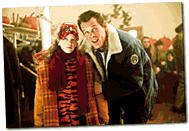SINS OF THE FATHER
Josh Zeman talks to Paul Schrader about his new film Affliction
 |
| Brigid Tierney and Nick Nolte in Affliction. Photo: Attila Dory |
Filmmaker: There are not that many stories out there about how hard it is to finance and make independent movies. All we hear these days are the success stories.
Schrader: Well, what's the figure this year for Sundance? Twelve hundred films submitted, maybe 130 will get shown, and out of that 130 maybe 40 will get distributed. Maybe 100 will go to video. So there are a lot of movies getting made that nobody's going to see. But you know, if enough people lose their money, then the situation should correct itself, I hope. Nobody's making any money right now -- the money is being made in the libraries and in the new media. This whole current swing that started off with the opening up of the cable systems in Europe and the success of Pulp Fiction -- the pendulum has swung a little bit too far.
Filmmaker: So what drew you to this Russell Banks novel and kept your interest in it over the years it took to get the film made?
Schrader: I saw it in a book shop when it came out in trade paperback, and it just caught me. The first line of the novel is actually the first line of the film: "This is the story of my brother's criminal behavior and his strange disappearance." I was just grabbed by it, so I bought it. Besides the language, the depth of theme and the depth of the characters, I think what I liked most about [the book] was the gimmick: half or two-thirds of the way through, it's like, boom! You realize that this small-time cop who thinks he is going to redeem himself by solving a murder is really going crazy, because there is no murder. The real drama is about his father, not about this "hunting accident."
Filmmaker: You've used that structure before.
Schrader: Yeah, it's kind of hidden. You use a genre to disguise your real business.
Filmmaker: Wasn't that same idea in Light Sleeper and American Gigolo? You've found a novel that finally exemplifies your structure and style.
Schrader: I view the film as a collaboration between myself and Russell Banks. It's not really one of my themes, it's more Russell's -- this whole theme of generational violence, male violence that is passed on from father to son. One of the differences between things that I have written and Russell's book is that I tend to end my pieces on a kind of grace note, and this one has none. I like some sense of moral grace. But Affliction is pretty bleak at the end. Another thing I like about the film and book -- Russell said to me once, "You know who the main character of the novel is?" It's the narrator [Rolfe, played by Willem Dafoe]. You don't see the narrator's life, but he tells you right in the beginning, "In telling this story I tell my own story as well." And you have to figure out Rolfe's story because it's under the surface.
Filmmaker: You say the murder mystery ends two-thirds into the film and that your subtext becomes the main text. Compared to Light Sleeper and American Gigolo, that transformation happens much quicker in this film.
Schrader: Yes, but you still need it to create audience identification. You need to get the audience behind the character when they may not be that willing. You can sort of root for Wade as long as [you think] he is going to solve this crime. And by the time you realize he isn't going to solve any crime, you have already identified with him, and you're caught.
Filmmaker: So what do you think you as a director brought to the script if the themes were mostly Russell's?
Schrader: I sort of climbed on top of Russell's theme: how do you kill the father? I had a very strong father and an older male sibling. My father was not abusive, he was not alcoholic, but there were enough similarities. I came from that part of the country with long cold winters, so I knew these people, and I knew their violence.
Filmmaker: I was reading the press release, and it kept speaking of male violence. But I don't think the film is really about violence. The violence in it seems more the result of cause and effect.
Schrader: Yes, that is kind of an easy handle. You know movies need handles of various sorts, and there should be themes in films that are acceptable to everyone. And then there should be layered themes underneath. So when Rolfe at the end says, "This is the story of generations of boys who were beaten by their fathers," that's kind of the obvious theme. That is put there so people who watch the movie can say, "Oh, that's what it was about, and I didn't waste my time." But there's other things the film is about too.
Filmmaker: What were your experiences working with Nick Nolte on this project?
Schrader: Well, this took a long time to get made because I had optioned the book and written the script assuming Nick would want to do it. But Nick felt that he should get his full price, and that's what took five years. I was not able to get it financed, and finally I gave up. When Nick realized that he would only get to play this role if he took substantially less money, then I was able to get it financed. What that also meant was that by the time he got into rehearsals, he knew this character cold. He had reams of notes. He had notes for every other actor. I remember once we were shooting and I was suggesting a different line reading. Nick said to me, "Oh, I don't think he would say it that way," and I realized that his decision had been made months ago, maybe even years ago.
 |
| Nick Nolte in Affliction. Photo: Attila Dory |
Filmmaker: So it was fortuitous that you had to wait those five years?
Schrader: Yes, and I wanted to stick it out with Nick. This character does some unpleasant things, and Nick has a very audience-friendly face and demeanor. He seems like a nice guy, a guy you would like to know. Other actors don't invite you in easily, so you need an actor who seems friendly, like an ordinary Joe.
Filmmaker: So you wanted that audience identification right off the bat?
Schrader: I wanted the audience to root for him because you know from the first line that it's not going to work out for him. So how do you still care for him? The actor has to get you to care for him. Willem wanted to play that role, and I just couldn't offer it to him because he doesn't have that kind of friendly physiognomy.
Filmmaker: The father-son relationship between Nolte and James Coburn seemed very organic.
Schrader: Well, I needed a big actor, a tall actor, someone bigger then Nick, because Nick's a big guy, and I also wanted an iconic actor. Coburn and Nolte represent two generations of Hollywood leading men. James is very much of the '50s, a swinging cat when men were men and girls were babes. Nick is a product of the '60s, where men were partners with women. So even though they are only about 15 years apart, they represent two generations of Hollywood male sensibilities.
Filmmaker: One of the most fascinating scenes in the film was Wade Whitehouse pulling out his own tooth.
Schrader: Well, that was another one of those sort of gimmicks in the book. You think that the affliction is maybe somehow tied to this toothache. When he gets that tooth out, maybe he will be better.
Filmmaker: Does the film have distribution?
Schrader: We just got a offer in the last week or so that Largo finds acceptable. There have been some offers out there, but they have been so low that Largo hasn't taken them. I think they got an offer, and it will be announced out of Sundance.
Filmmaker: Why do you think it was hard to get a good distribution deal?
Schrader: It's a buyer's market, and it's a dark film. The company that made it was in financial trouble, and they had told their Japanese backers that they would get a certain amount for this film. They had overestimated what they would get, so they were in a very tricky position since they were asking more then the market would carry.
Filmmaker: So you're still defining your career, still learning about what choices to make?
Schrader: Well, I think so. I wrote a script just recently that I think is one of the best I've ever written. It's for Scorsese, and it's called Bringing out the Dead, and Marty likes it a lot. This one is about a paramedic. Again, a kid who drives around Manhattan at night, only this time he is on the side of the angels, and he brings life instead of death. But he's still going crazy.
Filmmaker: Do you think, as an auteur making films, you can ever exorcise the themes that define you and reach some kind of catharsis? Or do those themes just become more important over time?
Schrader: They can "exercise," but they can't "exorcise." I got into film for the best of all possible reasons -- as a kind of self therapy with Taxi Driver -- and I still see it as self therapy. If you watch Deconstructing Harry, which is a very scathing film about Woody Allen, he's not a likable character. I am sure he exercised a lot of those demons [with this film], but I am sure he hasn't exorcised them.
Filmmaker: So you never rid yourself of the demons?
Schrader: No -- all you do is learn more about them and pursue them into the next realm.
Josh Zeman is a screenwriter and filmmaker living in New York City.
VOD CALENDAR


 See the VOD Calendar →
See the VOD Calendar →


